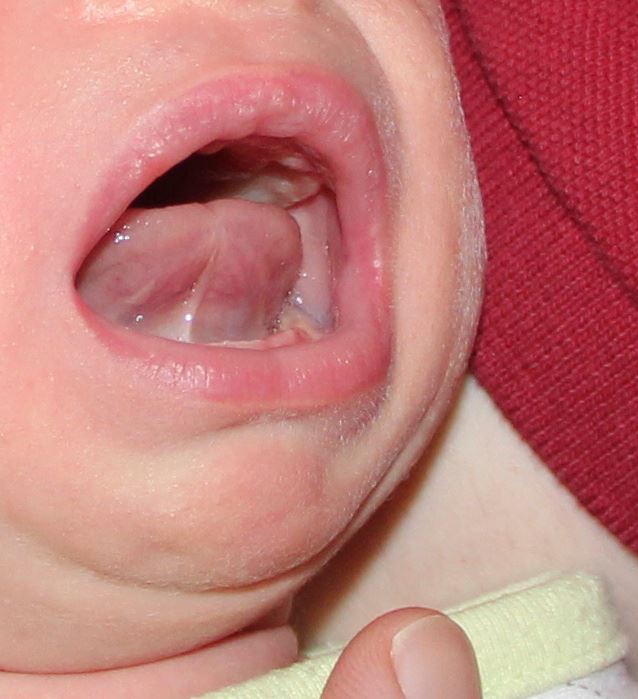Tongue Tie

This is a topic that seems to relate primarily to newly nursing babies or possibly shy people in social situations. We have neither of those here so why do I bring it up? Because 3 out of the 4 of us have a tongue tie! And all 3 will hopefully have this remedied in 2012.

But first let me back up. What is a tongue tie and why does it matter? Classic tongue tie (like in the photo above) is when the frenum, that is the piece of tissue under the tongue that attaches it to the floor of the mouth, extends too far toward the tip and prevents it from moving as freely as it should. In utero the tongue starts out fused to the floor of the mouth but should separate fully long before birth. One very simple test to see if you have a tongue tie is to open your mouth as far as you can and try to touch the roof of your mouth with your tongue. You should be able to touch the roof of your mouth without raising your jaw even a little. If you do this in front of a mirror you will see that it is attached further forward in the center than on the edges. This is normal. Tongue tie happens when that attachment goes too far forward. If you have a classic tongue tie you won’t be able to touch the roof of your mouth with your jaw fully open and it will be obvious that the attachment in the center is holding it back. This sort of tongue tie is the easiest to see and correct. It can vary in degree but you could very well have a severe one and have no idea. My husband of 10 years is almost completely tongue tied with a classic tongue tie. That is his frenum comes nearly to the tip of his tongue. Neither of us had any idea until I started looking into this a couple of months ago. No one ever mentioned a thing to him, not even his dentist and he just assumed his tongue was normal and people who could extend their tongue far out of their mouths were freaks. This kind of tie is also easy to see in a crying baby. When they cry they try to lift their tongue and the tether can be clearly seen.
Also when they stick it out it the tip of the tongue looks flat or like the top of a heart. It pulls in, in the center. My younger daughter had a tongue that looked like that at birth. You can see that the tongue is pulled in right in the center in the top photo.
Another kind of tongue tie is called a posterior tongue tie. This is when you have a thick tissue on either side of the tongue under it that impedes it’s ability to move easily and correctly. This is very easy to overlook. You can’t easily see it and it can be very difficult to feel for some. It can be thin like a filament or very thick. It has been called a speed bump, fence or ridge in the bottom of the mouth. If you feel in the mouth with a finger it should feel smooth. If you feel that bump that is a posterior tongue tie. My experience is that it takes several tries to know if you are feeling correctly if you are wanting to educate yourself on this subject. It may or may not make it impossible to touch the roof of your mouth or stick your tongue out. In general the impairment can be harder to demonstrate and evaluate.
Lastly there is what is called a lip tie. This is where the piece of tissue that connects the lip to the center of the gums extends down too far. This can actually come down so far that it grows between the two front teeth. It obviously makes it difficult to move your lip up and away from your gums. A lip tie makes nursing very difficult for a baby since being unable to move their lip makes it difficult or impossible to get the proper seal on the breast. It also can pull the teeth out of alignment quite dramatically. We think of bone as being fixed, but a steady pull on it by muscle or tissue will always win.

Some of the consequences of a tongue tie are (this is not an exhaustive list)
- Inability to breastfeed successfully
- The baby failing to thrive
- Sleep deprivation for the infant and/or nursing mother because of more frequent nursing
- Pain for the nursing mother including nipple damage, bleeding, blanching or distortion of the nipples
- Mastitis, nipple thrush or blocked ducts
- Problems with introducing solids
- Inability to chew age appropriate solid foods
- Gagging, choking or vomiting foods
- Persisting food fads
- Difficulties related to dental hygiene
- Persistence of dribbling/messy eating
- Delayed/impaired development of speech
- Deterioration in speech
- Behavior problems
- Dental problems/cavities because of inability to clean teeth with the tongue
- Loss of self confidence because they feel and sound ‘different’
- Strong, incorrect habits of compensation being acquired
- Improper palate formation because the tongue isn’t able to rest against it and encourage it to expand
- Compromised sinuses because of the high palate.
- Need for braces
- Inability to open the mouth widely affects speech and eating habits.
- Always having to watch their speech
- Inability to speak clearly when talking fast/loud/soft
- Clicky jaws
- Pain in the jaws
- Migraine
- Protrusion of the lower jaw, inferior prognathism
- Effects on social situations, eating out, kissing, relationships
- Dental health, a tendency to have inflamed gums, and increased need for fillings and extractions
My younger daughter had an mild classic tongue tie at birth with a slightly heart shaped tongue, but since she seemed to be nursing well I didn’t think I needed to do anything about it. Her pattern of frequent extended nursing seemed normal to me after my experience with her sister. Both girls gained very slowly but since they started out very large (9.9 and 11.1 respectively) I was told that this can be normal for big babies. After a few months she no longer had a heart shaped tongue and I assumed her tongue tie had resolved itself. Little J still talks like a toddler at nearly 4. She can’t make l or r or most blends and while this may be within normal for kids her age it points to improper use of her tongue that may or may not improve on it’s own with time. I did baby led weaning with my older daughter and tried it with J but she would get tired of feeding herself long before she was full and would then be cranky because she was hungry. Chewing was very tiring for her and she happily ate baby food off of a spoon I offered for a long time. She is now nearly 4 years old and will still request that we feed her almost every day for at least part of a meal. I always assumed it was because she has some low tone issues but since her low tone symptoms are largely related to eating I’m not so sure anymore. She had lots of digestive issues including motility issues, gagging and vomiting regularly when she was younger. Also persistent reflux and food sensitivities. GAPS has helped these issues a lot but they aren’t gone. Also her top center teeth are tilted in at the center and her bottom center two teeth have a significant separation between them. She currently has both a posterior tongue tie and a lip tie (her classic tongue tie has stretched enough that we think it isn’t an issue any longer) and while we can’t know for certain that it is contributing to all of her issues it certainly is effecting her tooth alignment and needs to be fixed soon before her adult teeth come in. I have high hopes that it will benefit far more than her appearance.
My husband has relatively clear speech, when he isn’t trying to talk quickly. (I do regularly accuse him of speed mumbling). He has only one cavity that he got recently (despite a WAPF/GAPS diet and straight teeth that never needed braces. He even still has 3 of his wisdom teeth! However, he has an extremely high narrow palate that most likely contributes significantly to the chronic sinus issues he has dealt with his whole life. Correcting his tongue tie can’t fix that now (but probably would have if it had been done when he was a young child). In fact it may be that correcting it now won’t fix much of anything. His tongue has been trained over the course of his life to act in a certain way to compensate for it’s impaired range of motion. The Dr who examined him commented on how big and thick his tongue is to make up for it’s impaired range of motion. This is one reason why the earlier the better for correcting a tongue tie, even a mild one. It has very low risk of harm and it gives the body the ability to develop a normal wide palate and proper tongue movement and speech patterns. It could be that Big J will naturally be able to take advantage of that new tongue freedom and be able to speak clearly at the speed of light, just like he has always wanted to. Or he may need therapy to teach his tongue how to move correctly before he will see improvement in his speech or other tongue related issues. I have often said that he is the luckiest person I have ever met, so if anyone will naturally improve from this procedure it will be him
So, now that we know, what can we do about it? Newborn babies often have their tongue tie corrected with a pair of scissors while being held immobile. Painful but quick and an important solution for a significant problem. Past the newborn stage that is impossible. The procedure itself doesn’t take long and isn’t complicated but you can’t have a flailing infant with scissors in her mouth. She has to wait till at least 6 months old to be old enough for general anesthesia. Infants generally recover very quickly from surgery but for an older child or adult recovery from a conventionally done tongue tie surgery take a week to 10 days and is painful plus the recovery from general anesthesia and the risks of it make many reluctant to revise any but the most severe tongue ties past infancy. Now, however, thanks to modern breakthroughs, the surgery can be done with a laser, painlessly without general anesthesia and with almost no recovery time. Just a topical anesthetic is used. Not even an injection of Novocaine is required in most situations. The procedure itself takes under 5 minutes, even for a complicated case. Many laser dentists are able to do this procedure right in their office. The Dr that we saw is in the process of getting a laser for herself but currently refers out most older children and adults. We have found a local laser dentist, Dr James Maxwel , with experience correcting tongue ties. He has a water laser that contains a topical anesthetic right in the water that is part of the laser. No shots, no trauma and very quick. Our dental insurance even covers the procedure out of network at 80%! It is considered a basic procedure. Of course check with your insurance for your own coverage. My husband is going to go first and get his tongue tie corrected and then we will see about scheduling the girls for their procedures. Depending on who does it, it may be covered by dental insurance or medical insurance.
This procedure is also done by ENT’s, Family Doctors, Pediatricians, and the like. Different Dr’s with all different bents decide to learn about this and help people with this little known but very real problem. Some estimate that as many as 10% of all people have the problem to one degree or another but most put it between 4-6%. If your Dr isn’t very informed ask if they know someone who is. You could also contact your local La Leche League leader and ask her if there is a local Dr or dentist who is able to diagnose and treat tongue tie.
It is not known what causes a tongue tie. It does tend to run in families. One theory is that it is a midline defect (your tongue is in the middle of the body after all). Midline defects include some very serious life threatening problems but may also be quite minor. It has to do with the very earliest development of the baby in utero. Midline defects can be caused by low folate in the mother. They happen very early in the pregnancy so the woman needs to have enough folate in her body before she gets pregnant or it is too late. This is why many processed foods are fortified with folic acid and women of childbearing age are encouraged to take prenatal vitamins even when they aren’t pregnant. Unfortunately folic acid supplementation isn’t very helpful for the estimated 40% of Americans with MTHFR mutations who can’t convert the folic acid found in supplements and fortified foods into the active form that their body needs. Testing for MTFR is a simple blood test and is usually covered by insurance. I hope to write a blog post about that soon as well. MTHFR has far more implications than just tongue tie and needs it’s own post.
Here are some links for you to do your own research
The kindest Cut? The Emotional Impact of the Tongue-Tie Maze | Maddie’s Musings
Efficacy of Neonatal Release of Ankyloglossia: A Randomized Trial
I am adding a link here to my first post on MTHFR.
My husbands tongue tie is now fixed. My post about that is here. Tongue Tie #1 is Fixed




24 Comments
Trackbacks/Pingbacks
- Who knew? Tongue Tie – Sound Mama - [...] was reading on my friend’s blog: Loving Our Guts about tongue ties and it explains a lot for me. Guess it’s …
- “Cherries On Top” - [...] issues my family faces are tongue ties, MTHFR mutations, adrenal fatigue and dental cavitations. We use essential oils, acupuncture, …


















Patty, thank you for this awesome post. I especially liked in your post about what causes it - very interesting. Makes sense it's a nutritional deficiency. I'm interested to see your post on MTHRF.
On the GAPS forum, you guys mentioned this to me, and it turns out my 2 girls do have a pretty bad lip tie, but I can't tell on the tongue. They both have/had infantile reflux. I'm so confused what is actually causing it, though. Neither had a hard time nursing AT ALL. I've heard clicking noises a couple times during nursing, but definitely nothing regular. I do know that my baby, when we started a homeopathic, started sleeping better (then we started GAPS and she got diarrhea for a long time, and started waking in the night again). So it's confusing to me if it's a gut problem or a tongue tie problem. How can my babies have both???? Except, as you said, it could be a nutritional deficiency, which would make unfortunate sense. So thanks again!
My girls were champion nursers. My older daughter had a hard time getting started (She wasn't allowed to nurse for the first 36 hours of life because she was in the NICU and then was required to have bottles for a while after that). She seemed to be a great nurser. Now I do wonder if she would have been faster and less often w/o a tongue tie. My dd with the more severe tongue issues did the breast crawl right after birth, latched perfectly and never looked back. Again I wonder if she would have nursed faster and less often but there is no real way to know that now.
Can they open their mouths all the way and then touch the roof of their mouth with their tongue? If you feel under their tongue with your finger do you feel anything lumpy or stringy or does it feel smooth? Read the links I provided for even more information. My kids are much improved on GAPS. But I do wonder how much this contributes to them not being completely better after 2 years. Hopefully we will know soon.
And a tongue tie issue can lead to a gut issue. It causes the reflux because it messes up the peristalsis from the start. Your gut is a tube from mouth to anus and there is a muscular wave of motion that moves from start to finish. If it is disrupted at the start it can effect the entire process.
That doesn't even mention the issues of poor chewing, not being able to properly wet the food with saliva in the mouth and start digestion because the tongue can't move the food as it should, and simply food aversions or preferences because of how easy or difficult they are to chew that can lead to nutrient deficiencies. And if mom has MTHFR mutation then the kids do too. And mom is likely unable to process toxins well and is low on available nutrients because of the inability to convert to the active form.
I was looking to refresh myself on MTHFR (it has been a few months since we were testing for and understanding this) and came across this blog. http://mthfr.net/mthfr-mutations-and-the-conditions-they-cause/2011/09/07/ Tongue tie is #56. I'm gonna go out on a limb and say that any child or adult with a tongue tie should be evaluated for MTHFR. It can have much more serious consequences than just a malformed tongue and should be checked into.
Interesting. DD had her lip tie fixed by the water laser when she was 5yo. She freaked, but it was really a pretty quick procedure (or would have been), maybe 20 minutes if she'd been more calm with it. They used numbing gel and some sort of injection for pain (but it was not a normal syringe) and then the water laser which sounded like popcorn. Pain later that night after the meds wore off, but we gave her tylonel (maybe?) for it and she was fine enough to go to school the next day, eat breakfast without any problems. It was a pretty thick one.
J has a very minor one that we'll deal with when he's older. At this age, E had lost several teeth, but he doesn't have any loose ones at all yet.
I'm commenting as anonymous because I don't want to mess with an accout, but it's Chris Ann!
Thanks CA,
Sorry she had such a tough time with it. Jason is going first and the kids are going to be allowed to watch so that should help. This dentist won't do an injection at all. I was going to have them do laughing gas if they got nervous but I just learned that is a huge mistake if you have a mthfr mutation (both do).
how interesting this is! according to your description, I myself have a TT though I would have never known…do you actually know people who can open wide and touch the tongue tip to the roof of their mouth?? i have to ask my hubby and friends now!! LOL.
I don't have a tongue tie and can easily touch the roof of my mouth with the tip of my tongue while it is open all the way. Have fun investigating your friends and family.
Patty, I read the post where your hubby got his tongue tie fixed, but never read this one. Guess what? I saw a holistic dentist on Tuesday the 17th for the first time and he did a thorough examination on my mouth and confirmed that I have a tongue tie! Yet another "condition" of MTHFR. Now I'm really curious to see the results of my labs. Thanks for writing about this. The dentist said I seem to have compensated for my tongue tie and he didn't recommend fixing it. It makes me think of my younger sister who had trouble enunciating when we were growing up, she probably has tongue-tie! I cannot even begin to touch the roof of my mouth with my tongue!
So, Patty, would an upper attached frenulum be a midline defect as well? And that would possibly point to MTFR also?
Hmmm, we have firstborn set up for a laser upper frenectomy this week. Sounds like we should maybe check into the MTFR stuff?
Yes it is. Really anything in the middle of the body that is not right from birth is a midline defect. Yes you should check into it. Remember this is not rare but it does have a big impact on your ability to cope with an increasingly more toxic world.
I was not born with the gift of perfect spelling and of course spell check can only catch so much. I welcome any help you would like to give in letting me know if a blog post needs editing. It is, of course, very difficult to edit your own work and I can’t afford to pay someone else to do so.
Patty, he’s a spammer. He’s only posted a generic post to get a link back to his spam website to up its ranking in Google search and make it appear legitimate when it isn’t. Delete posts like that. Pretty much anything not in English or weird sounding names like that will be spam.
Thank you!
I lined the family up this morning and had everyone try opening their mouths wide and touching their tongue to the roof of their mouths. I was the only one who could do it. It certianly explains my son’s dental issues and severe gagging with not being able to handle the roof of hs mouth touched or the top teeth brushed.
Now to figure out what to do about it.
That is the hard part. I’m still struggling with how to address this with my kids. I just noticed yesterday that my older dd’s lisp is suddenly much worse. I think I need to start both kids in some sort of speech therapy asap. I have a lisp and a tongue thrust (that speech therapy as a child wasn’t able to correct) and it does cause me distress at times. I don’t have a tongue tie
This is an issue that is suddenly much better understood than it was just a few years ago so you may be able to find someone local who can help him.
My 4yo son, who is our first child and first boy, was tongue tied at birth; we had it fixed immediately. Like your son, he has always gagged when I brush his top teeth. After reading this article, I checked his top lip attachment: his lip looks similar, if not worse, than the picture with this post. He also has a cross-bite. His teeth are very straight and he hasn’t had any problems. Our second child, another boy, wasn’t tongue tied and doesn’t seem to have the lip problem either. Our third child, a girl, however, was tongue tied. She doesn’t have any teeth yet, so I’ll have to keep an eye on her. Her lip doesn’t seem to be “tied”, so hopefully she won’t have any issues.
Thank you for this post! I had no idea how important understanding tongue tie could be.
P.S. My maternal grandmother, her father, my husband’s father and aunt, and a few cousins are/ were all tongue tied. All of those would be from a mostly German background as well. Has tongue tie been linked to any particular people groups?
It is not attached to any people groups but is attached to MTHFR genetic mutation which is equal across all people groups. However since it is a genetic mutation is will travel through families and it sure sounds like it is in yours. It is probably a good idea to look into getting tested for it. I have a couple of articles on here about MTHFR in my cherries on top area that you might want to read.
Did you see this article on using Oral Myofacial Therapy for tongue tie?
http://articles.mercola.com/sites/articles/archive/2013/04/07/orofacial-myofunctional-therapy.aspx
Interesting. I’ll have to look into it.
If you find the correct doctor, tongue tie can be corrected if it is missed at birth. I got my son’s tongue clipped in a second at 2 months old. The sooner the better and no bottles.
My 2 youngest were tongue tied with my son being the worst. He is also lip tied but it doesn’t cause problems with his teeth. But now I wonder about my daughter and a possible posterior tongue tie. She has a lisp as well, although slight. An interesting article!
A nurse in the hospital noticed my son was tongue tied, and I was never able to nurse, so I had to pump for 8 months. My sons was fixed in the doctors office when he was 6 days old, it took like 20 seconds and no Meds were given not was there hardly any blood.
Head on over to the Breastfeeding Revolution to learn more about Tongue Tie today! http://www.breastfeedingrevolution.com/patty
Thanks so much for your article; you made me discover I have a tongue tie! I told my mom and she said the pediatrician told her when I was a baby. He also told her by looking at my stool that I seemed malnourished. They supplemented with formula. You can imagine the rest of the story (celiac, etc). We met in GAPS a few years ago when I was trying to heal my reflux, you were always so kind in the GAPS forum. I remember your interest in methylation, which was unknown by me. Now I am studying it also. Our searches run parallel, except perhaps that I am doing the cutler’s protocol for heavy metals. Anyway I only wanted to say hi, wish good health for your family, and thank you for all the info in your blog.